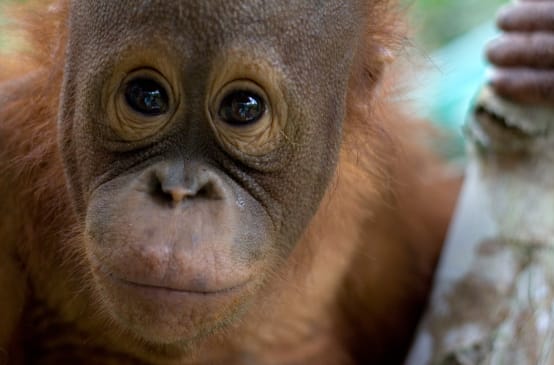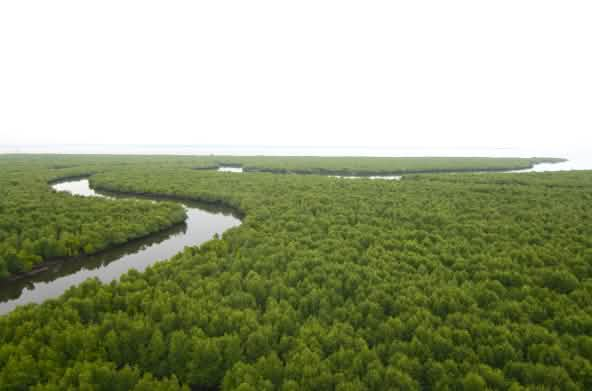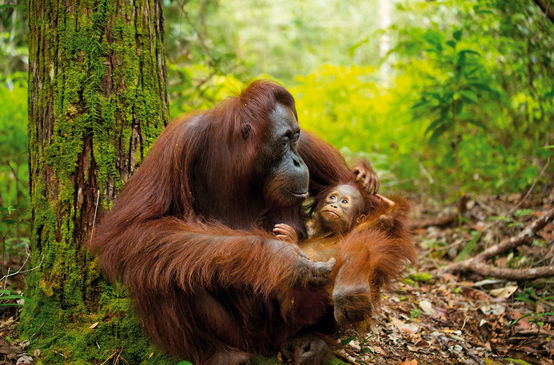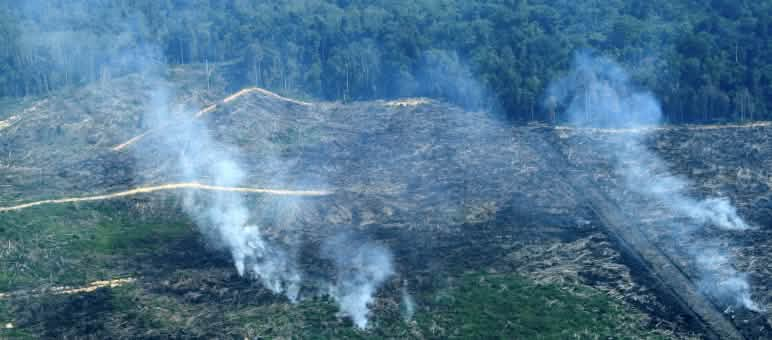A call to protect biodiversity: the Tripa peat bog
Indonesia: 25 organizations from Indonesia and Rainforest Rescue have issued a call for the protection of the Tripa peat bog on Sumatra to preserve Indonesia’s biodiversity
The Tripa peat bog on Sumatra exemplifies Indonesia’s lack of commitment to fulfilling its climate and biodiversity protection obligations. This vital habitat for orangutans and tigers continues to be destroyed for palm oil, even though two palm oil companies were convicted of illegal burning practices many years ago. The Tripa peat forest is currently being cleared again, the soil is being drained, and oil palm seedlings are being planted.
The “Coalition to Save the Tripa Peat Bog, Orangutan Habitat” (Koalisi Selamatkan Rawa Tripa, Habitat Orangutan), consisting of 25 Indonesian organizations and Rainforest Rescue, is calling on the Indonesian government and judiciary to take immediate and consistent action, as the Tripa peat bog is in an extremely critical condition.
Call to save Indonesia's biodiversity – the Tripa peat bog
Indonesian: Seruan LSM untuk menyelamatkan Keanekaragaman Hayati-Indonesia – Rawa Tripa
The text in English (slightly abridged):
Palm oil is blocking biodiversity protection in Indonesia
Indonesia is a key region for global biodiversity protection. The country has ratified the Convention on Biological Diversity (CBD), making an international commitment. The Indonesian Biodiversity Strategy and Action Plan 2025–2045 (IBSAP) aims to implement ecosystem and species protection as well as the sustainable use of natural resources.
However, implementation is lacking. The deforestation rate remains high. According to the Ministry of Forestry, another seven million hectares of forest have been cleared, 80 percent of which is for new oil palm plantations. Biodiversity goals are therefore failing due to economic interests, especially those of the palm oil industry.
Essential ecosystems play a crucial role in preserving biodiversity: mangrove forests, peat bogs, and karsts. These are habitats for endangered species and serve as corridors between protected areas. However, almost 20 percent (not including Papua) of oil palm plantations are located in these essential ecosystems.
Data on plantation concessions are not public, and the Ministry of Agriculture even ignores court rulings to make this information accessible. Politicians are closely involved with the palm oil industry and negotiate concessions among themselves without public consultation or the consent of the affected population. The result is countless land conflicts, abuse of power, and corruption.
Palm oil destroys the Tripa peat bog and its biodiversity
The case of the Tripa peat bog in the Leuser ecosystem on Sumatra is typical of the palm oil industry’s impact. Two palm oil companies, Kallista Alam and Surya Panen Subur II, have been destroying the peat forest for more than ten years, pushing Sumatran orangutans and Sumatran tigers to the brink of extinction. The two plantation companies are burning and destroying the carbon-rich deep peat soils.
They have recently cleared an additional 608.81 hectares and planted them with oil palms. Without immediate action, the peat bog is in acute danger, along with its threatened fauna and the lives of people who depend on an intact ecosystem.
Peat bogs store large amounts of carbon. According to analyses (Agus and Wahdini, 2008), the Tripa peat bog is the largest carbon sink in the province of Aceh and is of great importance for the global climate.
The Tripa peat bog stores nearly one cubic meter of water per cubic meter of peat soil, protects against flooding, and acts as a buffer zone during storms and tsunamis (Murdiyarso et al., 2004). Its protection is extremely urgent due to its water management functions.
Tripa is part of the Leuser ecosystem, one of the most important ecosystems in the world. It is home to 105 mammal species, 382 bird species, and 95 different reptiles and amphibians. The Leuser ecosystem is famous for being the only place on earth where the endangered Sumatran tigers, elephants, rhinos, and orangutans live in the same habitat.
The orangutan population in the Tripa peat bog was large before the palm oil plantations were established. Today, around 280 individuals remain, representing about four percent of the 6,600 surviving Sumatran orangutans. According to the Great Apes Survival Partnership (GRASP), a government program in alliance with UNEP and UNESCO, the Tripa peat bog is a high priority for orangutan conservation. The exact number of tigers still living there is unknown.
Civil society demands enforcement of the law
Regardless of pending protection status, deforestation in the Tripa peat bog must be stopped immediately. Indonesia must send a clear signal to the world, as the Tripa peat bog is one of the most important ecosystems. According to United Nations conferences, the climate and biodiversity crises are severe. Violations of the law in the forestry, environmental, and plantation sectors must finally be seriously prosecuted.
After the devastating fires in 2012, in which hundreds of orangutans died, the Ministry of Environment took the two palm oil companies Kallista Alam and Surya Panen Subur II to court for illegal burning practices. The trials dragged on for years, reaching the Supreme Court, which fined the companies in 2017 and 2018.
To date, the rulings have not been enforced. Worse still, both companies remain active in Tripa, and large international corporations apparently still source palm oil from Tripa today.
The demands of the “Coalition to Save the Tripa Peat Bog, Orangutan Habitat” (Koalisi Selamatkan Rawa Tripa, Habitat Orangutan), addressed to specific actors:
- Minister of Agriculture and Spatial Planning, Nusron Wahid: Revoke the permits for Kallista Alam (520.78 ha) and Surya Panen Subur (7,565.26 ha).
- Minister for Forests, Raja Juli Antoni: Take immediate action to save the Tripa peat bog.
- Governor of Aceh Province, Muzakir Manaf, and Director of Nagan Raya District, Dr. Teuku Raja Keumangan: Improve the protection status of the Tripa peat bog.
- Suka Makmue Administrative Court: Implement the court rulings revoking permits and imposing fines for renaturation immediately.
The civil society network to save the Tripa peat bog and protect biodiversity in Indonesia:
- APEL Green Aceh - Indonesia
- Rainforest Rescue - Germany
- Forest Watch Indonesia (FWI) - Indonesia
- Independent Forest Monitoring Fund (IFM Fund) - Indonesia
- Aceh Wetland Forum - Indonesia
- Koalisi Perempuan Jaga Lingkungan - Indonesia
- WALHI Sulawesi Selatan - Indonesia
- WALHI Nusa Tenggara Timur - Indonesia
- JARINGAN ADVOKASI TAMBANG SULAWESI TENGAH (JATAM SULTENG) - Indonesia
- PEMERHATI LINGKUNGAN HIDUP URAI UNI - Indonesia
- Save Our Borneo - Indonesia
- JPIC Kalimantan - Indonesia
- Yayasan Insan Hutan Indonesia (YIHUI) - Indonesia
- WALHI Kalimantan Tengah - Indonesia
- WALHI Papua - Indonesia
- SADIA MUKAH-SARAWAK - Malaysia
- CR Aceh - Indonesia
- Yayasan Pusaka Bentala Rakyat Jakarta - Indonesia
- Greenpeace Indonesia
- Perkumpulan Koalisi Air Rakyat (KAR) - Indonesia
- Kaoem Telapak - Indonesia
- AJI Jakarta - Indonesia
- Kanopi Hijau Indonesia
- Konsorsium Sumatra Terang Untuk Energi Bersih - Indonesia
- HIMAPA USB YPKP Bandung - Indonesia
- Koalisi Selamatkan Hutan dan Lahan Aceh - Indonesia
Further information:
Current petition to save the Tripa peat bog, habitat of the Sumatran orangutans: Indonesia: Protect the habitat of Tripa’s orangutans!
More about the current campaign on our Indonesian website:
https://www.hutanhujan.org/updates/13678/rawa-tripa-dan-kompleksitas-masalahnya
https://www.hutanhujan.org/updates/13138/lindungi-gambut-rawa-tripa-sekarang
Ongoing petition for the preservation of the Leuser ecosystem in the Spatial Planning Act: Protect Leuser's iconic wildlife!
On the devastating slash-and-burn clearances in 2012 and legal action against the plantation company Kallista Alam:
Indonesia: 14 years of impunity for arson in Tripa peat swamp forest
Stop Cargill – Stop the fires in the orangutan forest!
Save the last orangutan refuge!
Video (2012): Saving Leuser. Tripa. A film by Carlos Quiles
On January 8, 2014, Kallista Alam was found guilty of burning 1,000 hectares of peat forest. The company was sentenced to pay a fine of 9.4 million US dollars. In addition, it must contribute $21 million to the renaturation of destroyed areas.
The company sued through several courts. The Supreme Court finally confirmed the verdict (Mahkamah Agung Nomor 1 PK/Pdt/2017 of April 18, 2017 and Mahkamah Agung Nomor 690 PK/Pdt/2018 of October 17, 2018).
Kallista Alam is one of 22 companies that have had to stand trial for forest and peat fires since 2013. 14 of them have been convicted. But only one company has paid the fine so far, and none has ever restored the areas they destroyed.
This page is available in the following languages:

Indonesia: Protect the habitat of Tripa’s orangutans!
Officially, the peat forests of Sumatra are protected as a habitat for critically endangered orangutans. The encroachment of oil palm plantations must stop NOW!

Mangroves, peat bogs, swamps: protecting Aceh’s wetlands
Burned forests, stonewalling corporations, and Indigenous rangers replanting hope: Inside Aceh’s struggle for its last wetlands.

Defending rainforests in Southeast Asia
The forests of Southeast Asia are the last refuge and habitat of orangutans, Sumatran tigers, birds of paradise and Komodo dragons.

Climate and the rainforest
Rainforests are tightly intertwined with the climate: while forests are suffering from global warming, they are also the key to climate protection.

